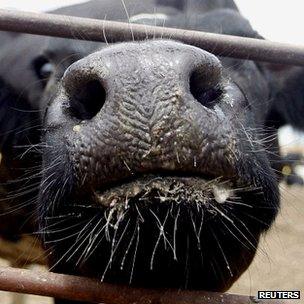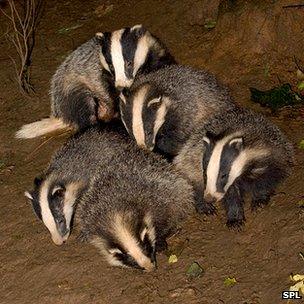Badger culling legal challenge fails
- Published
- comments

Bovine TB costs the UK economy more than £100m per year, mainly in farm payments
A legal bid to block badger culling in England has failed in the High Court.
The government says that culling will help combat cattle tuberculosis, which costs the UK more than £100m per year.
The Badger Trust argued that the cull was illegal, as it will at best make a small impact on the disease and could make it worse.
Culling is now likely to go ahead later this year in west Gloucestershire and west Somerset, with as many as 40 sites to be licensed eventually.
Badgers become infected with the bacteria that cause bovine TB, and can carry them from farm to farm, although more cattle contract the disease from contact with infected herds.
Plans to begin culling in Wales <itemMeta>news/uk-wales-politics-17435827</itemMeta> in favour of a vaccination policy following the change of Welsh Assembly Government last year.
At the High Court hearing in London last month, the Badger Trust argued that the cull plans drawn up by the Department the Environment, Food and Rural Affairs (Defra) <itemMeta>news/uk-england-18583169</itemMeta> .
Badgers are generally protected under UK law, but exceptions are allowed for disease prevention.
The trust's lawyers argued that that the small reduction in cattle TB incidence anticipated by government scientists did not qualify as "prevention".
The government does not set a specific target for the percentage reduction in cattle TB incidence it expects to see, but the latest evidence suggests that nine years after culling, incidence might fall by 9-16%.
Scientific evidence, stemming mainly from the <link> <caption>UK Randomised Badger Culling Trial (RBCT)</caption> <url href="http://archive.defra.gov.uk/foodfarm/farmanimal/diseases/atoz/tb/isg/report/final_report.pdf" platform="highweb"/> </link> , shows that culling can actually spread the disease, as it disturbs badgers' family groups and makes them roam further afield, coming into contact with more herds.
The government acknowledges this, but believes its culling strategy will get round the problem.

Badgers (Meles meles) are protected by a number of UK and European laws
The trust also argued that the plan to have culling licences issued by Natural England was outside the law, and that the only person authorised to issue them was the Environment Secretary - currently Caroline Spelman MP.
In his judgement, Mr Justice Ouseley ruled against the trust on both counts.
"Although the Secretary of State has tried to interpret the science to her advantage, nothing has altered the basic finding that while badgers are implicated, killing them can make no meaningful contribution to tackling the disease, and cattle measures in themselves are sufficient if properly applied," said Badger Trust chairman David Williams.
"We did not embark on this litigation lightly; and England now faces the prospect of 40,000 badgers being slaughtered over the next four years."
Costing the cull
The trust also raised issues regarding cost.
The government says that cull areas must be at least 150 sq km in size, and the groups of landowners and farmers applying to cull must show they can access at least 70% of the land.
The groups will employ trained marksmen to shoot the badgers as they roam - so-called "free-shooting".
The effectiveness of free-shooting badgers has never been studied. In the RBCT, they were trapped in cages and then shot.
The trust pointed out that if free-shooting proves ineffective, farmers may have to resort to trapping - which would increase costs approximately 10-fold.
The government said it was pleased with the judgement.
"No one wants to cull badgers, but last year bovine TB led to the slaughter of over 26,000 cattle," said a Defra spokesman.
"To help eradicate the disease, it needs to be tackled in badgers.
"We will continue to work with the farming industry so badger control in two pilot areas can start as soon as is practical."
Natural England is currently processing the Somerset and Gloucestershire applications.
The judge left the option of a written appeal open to the trust, and it has a week in which to decide whether or not to pursue that avenue.
Humane Society International has mounted a parallel challenge through the EU, arguing that Defra's plans contravene the Bern Convention on protection of wildlife.
- Published25 June 2012
- Published22 May 2012
- Published20 March 2012
- Published19 March 2012